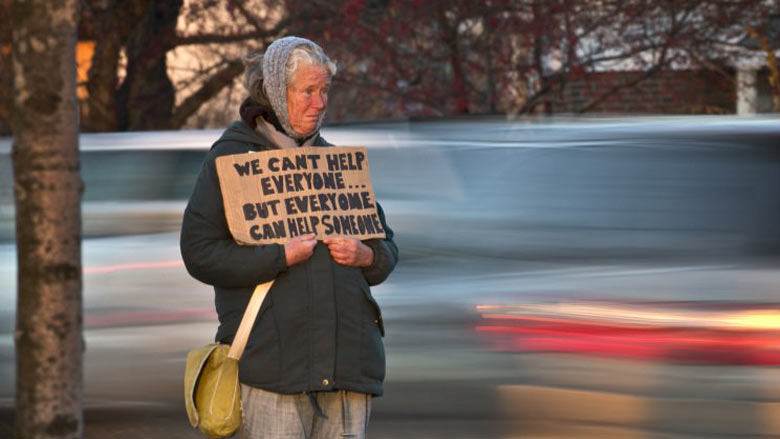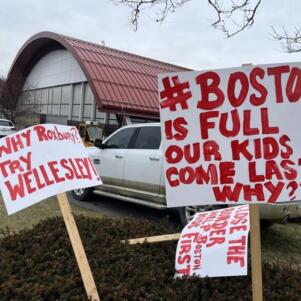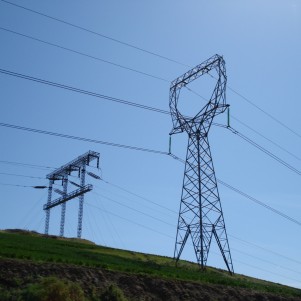Report: Ten things that keep Mainers poor
By Kelly Thomas | August 18, 2016, 6:20 EDT
 A homeless woman panhandles in Portland, Maine. (AP photo)
A homeless woman panhandles in Portland, Maine. (AP photo) PORTLAND – Excessive government regulation and a welfare system that fosters dependency are two of the top contributors to income inequality in Maine, according to a recently released report by the Maine Heritage Policy Center. The June 2016 report, “Top 10 Things Keeping Mainers Poor,” which was compiled by analyst Liam Sigaud, outlines the primary factors that make Maine consistently one of the hardest states in which to make a living.
As of June, 12.3 percent of Maine residents were living below the poverty line, making it the 22nd poorest state in the nation. New Hampshire is the most prosperous state, with only 7 percent of its population below the poverty line.
According to the report, excessive taxation and regulation have driven companies and high net worth individuals out of state, costing Maine jobs as well as philanthropic dollars, which are critical to bolstering local civic organizations.
At the same time, the regulatory state makes the cost of living for Mainers higher than it needs to be by driving up Maine’s housing, energy, child care, and transportation costs. Maine’s cost of living, which is the nation’s 12th highest, is currently 6 percent above the national average, which ranges from $2,372-$6,908 a month based on family size.
“Compared to other New England states, Maine places the highest tax burden on its citizens,” Sigaud told the NewBostonPost. “The poor are faced with exceptionally high tax burden in addition to the heightened cost of living due to government regulations on childcare and vehicle ownership.”
According to the report:
— Maine’s energy costs are among the highest in the nation, in part due to the brutal New England winters, which cause massive consumption of heating oil around the state, driving up energy prices. But Maine’s convoluted regulatory regime also stunts its own energy sector, limiting innovation and keeping prices high.
— Half of Maine renters dedicate more than 30 percent of their income toward housing, a fact the report attributes to decreased supply caused by strict rent control policies. In addition, the cost of home ownership has risen due to onerous zoning regulations that have driven up the cost of home building, further restricting supply.
— The annual cost of day care in Maine is comparable to a year’s tuition at one of Maine’s public colleges. Single-parent families in Maine now spend upwards of 73 percent of their paychecks on childcare, while two-parent families at the poverty line pay 68 percent for center-based care. The report attributes the high cost of daycare in Maine to government regulation that has driven up the operating costs and forced many to shut their doors, limiting the supply of childcare.
— The cost of vehicle ownership in Maine has also shot up due to stringent inspection and registration requirements. These costs have a particularly negative impact on Maine’s rural residents who are dependent on automotive transportation to get to jobs many miles away.
In addition to the high cost of living created by the state regulatory burden, the report says Maine’s welfare system keeps residents dependent on government assistance. The report claims that Maine’s relaxed eligibility standards dis-incentivize work for able-bodied individuals. In 2012, Maine instituted a five-year time limit on public assistance, leading to a 64 percent drop in enrollment by 2015. But the report maintains that there is much work left to be done, citing Georgia’s welfare to work program, which requires to complete an upfront job search and participate in employability workshops and orientation. According to the report’s findings, only 1.8 percent of Georgia’s population receives cash assistance similar to TANF, as compared to Maine’s 5.2 percent.
The report concludes that the government has created a system in which it is nearly impossible for Maine residents to break the cycle of poverty. The report calls for a number of policy changes aimed at deregulating the state economy and creating a more business-friendly environment and create a more robust job market.
“In most areas in Maine, the government has too big a role,” Sigaud said. “If it gave private sector more flexibility, a lot of these costs would come down, particularly for Maine’s lower-income populations.”
Read the full report here.











